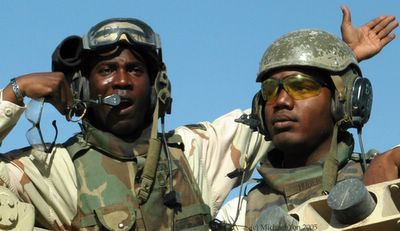Walking the Line V
One Journey Ends
Mesopotamia
Six months of patience paid off, when I finally had the opportunity to ride along with Command Sergeant Major Mellinger as he traveled across Iraq on his continuous mission to assess conditions of the troops. For three weeks, as we traveled in Iraq, Kuwait and on the North Arabian Gulf, he diligently captured the most comprehensive first-hand picture of what is happening here.
Reading like a travelogue from "30 Days Around the World" tours, our itinerary began as we drove from Mosul in northern Iraq down through Baghdad, down further to Kuwait and from there we flew out to a Navy ship in the North Arabian Gulf, returning to Kuwait and finally driving back to Baghdad. Once there, we visited places in the region and then headed back down to Kalsu and surrounds.

At every stop, CSM Mellinger met with a diverse range of people, from top generals and political leaders to fresh troops standing long, hot, dusty days and nights on guard towers at seemingly forgotten outposts. He never failed to warn, over and over, about various dangers, such as the increasing sniper threat that is killing more and more of our troops. In fact, we had just been in the hospital when an American soldier named Arnold Duplantier was brought in, fatally wounded by a sniper's bullet that struck his heart.
Following a visit with Marines at Fallujah, we drove out to spend time with some Special Forces in Diyala Province near Iran. On the way to Balad, we came to an area where American forces had just cleared an IED, but left a traffic jam. CSM Mellinger and some of the soldiers dismounted and began to pick their way through. Ordinarily, I'd step out, but this time, the threat seemed very high, so I stayed in the Humvee. In the event of follow on attacks or blasts, it would be useless to have everyone flopping around on the road. Here in this desert combat zone, wisdom rations both water and sense.
At Balad, meeting with the top Command Sergeant Major for Special Operations forces in Iraq, I glanced up and saw a photo of Richard Ferguson on the conference room wall. Fergy, an old friend, had died in Samara, and now his photo is on the wall next to photos of eight other Special Forces soldiers who died in Iraq. I had attended Fergy's final roll call in Colorado. Long before the war had started, many of the Special Forces soldiers stationed there told me of their certainty that Iraq would devolve into civil war after the invasion. Searching my memory now, I can't recall a single Special Forces soldier who predicted otherwise; history has proven they were correct.
The Special Forces soldiers at Balad talked frankly about the pace of progress and challenges they face with training the new Iraqi forces. They recounted that many Iraqi soldiers and police officers are apparently losing much of their salaries to corrupt superiors who skim the payroll, leaving the soldiers and police to steal from civilians. This can be attributed to culture and custom and it's bound to disturb many people in the west. But the Special Forces soldiers take it in stride. I've learned to gauge the relative corruption of places by the cleanliness of their drinking and bathing water. The water is not clean here. The water is scarce yet free, and since it's free, people waste it. In the human world, there are but small islands of relative-justice. There's no place like home, no place like home, no place like home.

Iraq's future will soon be in their own hands. Iraqis can then display for the world if Iraqis are truly smart, and truly civilized, or just thugs with oil, and money to buy giant weapons. Meanwhile, rivers of oil and water are wasted by Iraqi hands. ----
Before parting company with CSM Mellinger, we attended a memorial on LSA Anaconda for Specialist Ryan Montgomery from Kentucky. Ryan and his twin brother Bryan had both joined the Kentucky National Guard and were twenty-two years old. They were serving in Iraq when Ryan was killed by a bomb. During the ceremony, soldiers referenced the attacks in London as an important reason to stay here in Iraq, and to see the job finished. I saw it with my own eyes, and heard it with my own ears when soldiers from Kentucky said they needed to be here to prevent attacks in places such as London, or at the Kentucky Derby, or in Germany.

My most informative period in Iraq ended when I finally said goodbye to CSM Mellinger. He departed for Baghdad, and I stayed in Balad. I got a seat on an Air Force C-130 that was headed for Mosul. The airplane was filled with sixty tires, the kind that are constantly being blown off the Stryker vehicles. When we landed in Mosul, the war was still here, waiting.



<< Home